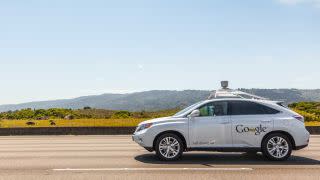Should Developers of Driverless Cars Share Test Data?

A key issue is emerging in the development of self-driving cars: In order to make sure the technology works, should developers be sharing with the government the data they collect in road tests?
Having each developer go it alone could add years to the process, while exchanging information could speed development. Even though the cars on the road today may not be fully self-driving, many have cameras and sensors that could record useful data about traffic behavior, crashes, and near misses.
However, sharing test data raises significant privacy concerns not only for drivers but car companies anxious to protect their trade secrets.
A debate between automakers, tech companies, trade groups, and consumer advocates is breaking out after the National Highway Traffic Safety Administration asked for comments last month on its recently published guidelines for testing autonomous driving features. Nearly 1,200 motorists, manufacturers, and trade groups responded, including Consumers Union.
NHTSA also asked in September for access to whatever data companies are using to prove their technology is safe. The agency argued that getting a common set of facts for everyone to examine would help refine the technology and get self-driving cars on the road more quickly.
An examination of the public comments showed that some big developers voiced support for sharing. Apple urged NHTSA to go ahead and set up a data-sharing system, even as it figures out a way to keep consumers’ personal data protected.
Apple said companies should provide enough data to reconstruct events leading up to accidents, including a timeline, vehicle speed, and direction, as well as characteristics of the roadway and nearby objects.
“Companies should share de-identified scenario and dynamics data from crashes and near misses,” Apple said in its comments to NHTSA. “By sharing data, the industry will build a more comprehensive dataset than any one company could create alone.”
Apple says it wants to work with NHTSA to help define the best practices for the industry. Company spokesman Tom Neumayr says it’s “investing heavily in machine learning and autonomous systems, and there are many potential applications for these technologies, including the future of transportation.”
Some companies are hoping to use crowd-sourced data from their customers’ cars in real-world driving. Tesla hinted earlier this year it was going to be doing this as it works out the self-driving car software. But the company hasn’t said whether it will share its data, nor did it address the issue in its comments to NHTSA.
Google, which has tested driverless technology more than any other company, is taking a more nuanced position. The company said in comments to NHTSA that it agrees that data-sharing could enhance safety, but only "if implemented in an appropriate manner that respects proprietary and sensitive information."
Google thinks a lot more work needs to be done to make data anonymous and create formats so that it can be usefully shared.
Other automakers have balked at sharing, worried about losing control of confidential business information. There’s also a fear of creating a giant government database that will be costly to build and almost impossible to maintain.
The Alliance of Automobile Manufacturers, whose members include GM, BMW, and Toyota, were against the idea unless there were a lot of carefully constructed safeguards. It said NHTSA appears to expect a stream of “crash and ‘near-crash’ data will be gathered and stored in real time by automakers” for use by regulators, other automakers, and the public.
The trade group sees a lot of problems with this—including a loss of “sensitive intellectual property” and the possible violation of antitrust laws.
“Such an undefined, and massive, data collection requirement is neither practicable nor reasonable,” the Alliance said.
The Self-Driving Coalition for Safer Streets, a single-issue trade group formed by Ford, Google, Uber, and Volvo—all of whom support the idea of fully autonomous cars with no human intervention—also is worried about NHTSA not being able to protect confidential information.
The group said the unintentional release or hacking of business secrets would have “enormous repercussions in the marketplace with respect to development and evolution of this industry.”
Watchdog groups see other dangers. The Electronic Frontier Foundation said NHTSA was only playing lip service to protecting consumers, and it should mandate privacy protections and restrictions on how car data is used or shared.
Recommending “constant collection of data by private entities” is bad public policy, the group said, adding that it is “particularly problematic for connected or autonomous vehicles, which collect highly sensitive data, such as biometric data and location information.”
Consumer groups favor more openness. Laura MacCleery, Consumers Union’s vice president for consumer policy and mobilization, told the House Energy and Commerce Committee last month that the safety benefits of autonomous driving are entirely speculative and based on data that companies keep private.
“Regulators and consumers deserve to know the basis that companies use to determine that an automated technology is safe,” MacCleery said. “This kind of disclosure would only help companies build trust in their products.”
Another group, Consumer Watchdog, said drivers won’t gain confidence in the experimental technology without transparency about its performance.
Autonomous vehicles collect more and better data about the operations of the car than any conventional vehicle, the group’s privacy project director, John Simpson, said in written comments to NHTSA. When they can’t handle a situation, or the technology fails, the public and regulators need to know why, he said.
“Full public access to this test vehicle data, especially when a crash occurs or a car is incapable of handling a situation on the road, is indispensable to any meaningful evaluation of whether autonomous vehicles are safe,” Simpson said.
More from Consumer Reports:
Top pick tires for 2016
Best used cars for $25,000 and less
7 best mattresses for couples
Consumer Reports has no relationship with any advertisers on this website. Copyright © 2006-2016 Consumers Union of U.S.
